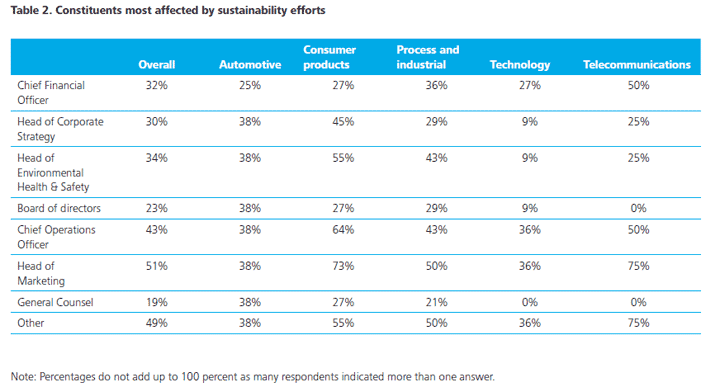Not surprisingly, a new survey of executives responsible for sustainability efforts at 48 large, mostly manufacturing-based corporations see those initiatives as still relatively immature, with a still sizable gap between stated goals and the investment and focus needed to get there.
The new report from Deloitte (available here: Sustainability in business today: A cross-industry view) says the data from the survey “suggests that many companies have a clear gap between their leaders’ aspirations with regard to sustainability and the way that sustainability is enabled within their organizations.”
From our view, that really should not be surprising, given the relative newness of sustainability strategies, the still evolving definition of what sustainability really means, the impact of the recession on discretionary spending, and still unclear signals from consumers about what they will pay for.
The report, in fact, says companies need to expand their definitions of sustainability, focusing not only on the energy/environmental aspects, but also on “social” components as well, or the third leg of the so-called “triple bottom line” of financial, environmental, and social responsibility.
“Attention to social sustainability issues should help organizations in their efforts to drive for competitive advantage by helping them establish or maintain a “Social License to Operate” in their target communities and markets,” the report says.
Modest Alignment with the Businesses
The survey showed that sustainability executives saw only a modest level of alignment between their agendas and the rest of the business.
Not surprisingly, many reported that that alignment was an ongoing process that occurred at different rates in different areas of the business.
The recession and tight reins on spending and investment again not surprisingly were viewed as large barriers to closing the gap between vision and reality.
One respondent noted that “Right now, the economy is such that we are not allowed to fork out the expenditure for something that would give us long-term benefits but is costly. I think that the message from the global office is that we have to look at sustainability as much as possible, but even though it is something that the parent company would like us to do, they would not be okay with us spending a quarter of a million dollars on it.”
Another respondent noted that US organizations faced challenges in developing the business case for investments to improve energy efficiency: “The cost of energy and water in general is still very cheap – we do not pay the full cost in the US, so justifying changes for this purpose [can be] very difficult.”
In terms of the opportunity to benefit from sustainability, the most frequently mentioned areas were opportunities related to manufacturing process and operations (46%), brand enhancements and perception (31%), and supply chain (21%).
What executives and functions are most affected by sustainability efforts? As shown in the table below, overall the Chief Operating Officer (COO), which can be thought of as a proxy for the supply chain, was called out as the second most affected (43% of respondents) behind the head of marketing (51%), indicating that companies view sustainability strongly in terms of both market opportunity as well as operational/supply chain improvement.

Source: Deloitte
The typical progression, Deloitte says, “is that sustainability first surfaces as a concern for functions such as legal and compliance; then, awareness of its impact spreads to operational functions, such as supply chain; and finally, companies begin to understand how it can affect demand-side functions such as sales and marketing.”
An Expanded Concept of ROI for Green Investments?
The challenge in getting many sustainability efforts funded, even those related to energy reduction, means it might be time to take an expanded view of ROI, Deloitte says.
“To improve its performance, a company needs to do more than reap an immediate financial ROI on its sustainability initiatives. It also needs to consider managing risk, building its brand and reputation, complying with regulatory requirements, and investing in developing future products and services that will be viable in a world where sustainability plays a greater role in driving buying decisions,” the report says. “Isolated initiatives that carry short-term financial ROI are not enough; we believe that a long-term focus, a structured, integrated approach, and a willingness to consider tradeoffs with respect to ROI duration and measurement are all essential to realizing value through sustainability and managing future risks.”
Relatedly, many respondents lamented that there was not enough “structure” around their company’s sustainability efforts – budgets, staff, technology, etc.
The report notes that in many companies that have designated a “corporate sustainability officer” or equivalent to be responsible for sustainability, such roles do not typically carry financial or operational accountability or the investment budgets necessary to effect meaningful change. (Some companies, in fact, assign sustainability oversight to a committee, which spreads accountability for sustainability across a number of traditional functions.)
Among other recommendations, the report suggests companies should organize their sustainability efforts (and metrics) into four key areas: the supply chain, the demand chain, emerging technology, and new regulatory requirements.
What’s your reaction to the Deloitte report findings? Do we need an “expanded view of ROI for sustainability investments? Do should sustainability executives have more structure in terms of budget, staff, etc. to get things done? Let us know your thoughts at the Feedback button below.

TheGreenSupplyChain.com is now Twittering! Follow us at www.twitter.com/greenscm
|